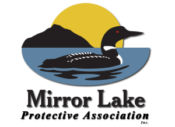
Resources and Links to MLPA Partners Formal and Informal
The Mirror Lake Protective Association relies on alignment with like-minded organizations.
Our connections with individuals within these organizations and the resources offered help a small lake like ours have access to information and strategies offered across the state of New Hampshire and beyond.
Mirror Lake Bylaws
Download the Mirror Lake Bylaws PDF
Clicking button will open the Mirror Lake Bylaws PDF in a new tab
Links to Organizations with Goals Aligned With Those of MLPA:
Lake Winnipesaukee Association
https://www.winnipesaukee.org/
Loon Preservation Committee
https://loon.org/
Moose Mountain Regional Greenways
https://mmrgnh.org/
New Hampshire Association of Conservation Commission
https://www.nhacc.org/
New Hampshire Department of Environmental Services
https://www.des.nh.gov/
New Hampshire Fish and Game Department
https://www.wildlife.nh.gov
New Hampshire Lakes Association
https://nhlakes.org/
Tuftonboro Conservation Commission
https://www.tuftonboronh.gov/conservation-commission
UNH Extension Lakes Lay Monitoring Program
https://extension.unh.edu/natural-resources/land-conservation-water-resources/lakes-lay-monitoring-program
Wentworth Watershed Association
https://wentworthwatershed.org/
Wolfeboro Waters
https://www.wolfeboronh.us/wolfeboro-waters-committee/wolfeboro-waters
Additional resources may be found in the Information section of the MLPA website under Education Materials
Other Resources:
OTHER RESOURCES
Aquatic Plants of Mirror Lake Guide 2019 updated version. Photos and descriptions of plants native to Mirror Lake (in contrast to invasive species of plants that are harmful)
https://www.mirrorlakenh.org/wp-content/uploads/2019/10/FINAL-Mirror-Lake-Aquatic-Guide-Kingswood-Press-Sept-2019.pdf
Best Management Practices https://gmcg.org/advocacy/project-bmp/
Best Management Practices (BMPs) protect water quality and promote soil conservation; the 10 most
protective activities are listed in this manual from Effingham, NH
LakeSmart: A lake-friendly living program https://nhlakes.org/lakesmart/
A guide for homeowners with regard to education, evaluation, and recognition of Best Management Practices. Start the process by taking the online survey then decide if you would like a visit and free consultation!
Shoreline Protection Act https://www.epa.gov/laws-regulations/summary-shore-protection-act
A summary of the US Environmental Protection Agency (EPA) laws and policies regarding shorelines
Shoreline Protection Act NH https://www.des.nh.gov/protected-shoreland-faq
NH questions, answers, and descriptions of the Shoreline Protection Act as implemented in New Hampshire
ISSUES BECOME INITIATIVES:
Advisories: https://www4.des.state.nh.us/WaterShed_BeachMaps/
Up-to-date list of beach closures in NH, including Mirror Lake (should that happen) due to outbreaks
Cyanobacteria: Harmful Algal Blooms (HAB) Associated Illnesses CDC (PDF)
Potential dangers of cyanobacteria in New Hampshire waters
Cyanobacteria: NH Waters What is Cyanobacteria? (PDF)
Information about cyanobacteria and the hazardous algae-looking blooms that can become toxic
Cyanobacteria: What to Do If You Observe a Cyanobacteria Bloom (PDF)
Harmful Algal Blooms: Harmful Algal Blooms (HAB) Associated Illnesses CDC (PDF)
Potential dangers of cyanobacteria in New Hampshire waters
Lakes Lay Monitoring Program https://extension.unh.edu/natural-resources/land-conservation-water-resources/lakes-lay-monitoring-program
The UNH Extension program for sampling lake water
Milfoil in NH https://www.des.nh.gov/sites/g/files/ehbemt341/files/documents/2020-01/bb-23.pdf
A description of the dangers of the invasive plant milfoil and the status of milfoil in NH
New Hampshire Wildlife: https://www.wildlife.nh.gov/
Septic Systems https://nhlakes.org/wp-content/uploads/Septic-Fact-Sheet.pdf
How a septic system works and what is needed to care for a septic system
Stormwater Management I: NH Homeowner’s Guide to Stormwater Management
https://www4.des.state.nh.us/SoakNH/wp-content/uploads/2020/03/Homeowners-Guide-to-Stormwater-Management-2019.pdf
Do-it-yourself stormwater solutions for your home
Stormwater Management II A Shoreland Homeowners Guide to Stormwater
Management (PDF) Comprehensive guide to assist shoreland homeowners in reducing or preventing polluted stormwater or meltwater runoff

